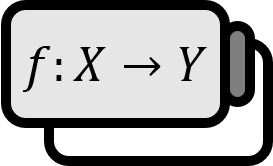Associated Legendre Polynomials for Negative Index m
Formulas
The Associated Legendre Polynomials obey the proportionality relation below, depending on the sign of $m$.
$$ P_{l}^{-m}(x)=(-1)^{m}\frac{(l-m)!}{(l+m)!}P_{l}^{m}(x) $$
$$ (1-x^{2})\frac{ d^{2}y }{ dx^{2} }-2x \frac{dy}{dx}+\left( \frac{-m^{2}}{1-x^{2}}+l(l+1) \right)y=0 $$
Explanation
Looking at the associated Legendre differential equation, the section regarding $m$ is shown as $m^2$, so whether $m$ is positive or negative doesn’t affect the solution. Thus, the associated Legendre polynomials can be derived as follows.
$$ \begin{align*} P_{l}^{m}(x)&= (1-x ^{2})^{\frac{|m|}{2}} \frac{ d^{|m|} }{ dx^{|m|} } P_{l}(x) \\ &=(1-x ^{2})^{\frac{|m|}{2}} \frac{ d^{|m|} }{ dx^{|m|} }\left[ \dfrac{1}{2^l l!} \dfrac{d^l}{dx^l}(x^2-1)^l\right] \end{align*} $$
Therefore, according to the formula above, $P_{l}^{m}(x)=P_{l}^{-m}(x)$. However, rather than seeing them as equal, they are considered to be proportional. Since merely multiplying the solution of a differential equation by a constant still results in a solution, assuming $A$ to be an arbitrary constant, then $P_{l}^{-m}(x)$ is expressed like $AP_{l}^{m}(x)$. This article will demonstrate that $A=(-1)^{m}\frac{(l-m)!}{(l+m)!}$ holds.
Derivation
First, applying the Leibniz rule to the differentiation part of the associated Legendre polynomials gives
$$ \begin{align*} \frac{ d ^{l+|m|}}{ dx^{l+|m|} }(x^{2}-1)^{l} &= \frac{ d ^{l+|m|}}{ dx^{l+|m|} }[(x-1)^{l}(x+1)^{l}] \\ &=\sum \limits _{k=0}^{l+|m|} \frac{(l+|m|)!}{(l+|m|-k)!k!}\frac{ d ^{l+|m|-k}}{ dx^{l+|m|-k} }(x+1)^{l}\frac{ d ^{k} }{ dx^{k} }(x-1)^{l} \tag{1} \end{align*} $$
Case 1. $m>0$
Consider the case of $m>0$. Then, $l+|m|-k=l+m-k=l+(m-k)$. The index $k$ ranges from $0$ to $l+m$. In the case when $k < m$, since $l+(m-k)>l$, the number of differentiations exceeds the highest order term’s degree
$$ \frac{ d ^{l+|m|-k}}{ dx^{l+|m|-k} }(x+1)^{l}=0 $$
Therefore, the RHS of $(1)$ for $0\le k <m$ is entirely $0$. Similarly, if $k>l$, then $\frac{ d ^{k}}{ dx^{k} }(x-1)^{l}=0$, so only in the case of $k\le l$ does a term other than $0$ exist on the RHS. That is, for $k$ that is not $m\le k \le l$, the RHS is $0$, hence $\sum\limits_{k=0}^{l+m}=\sum\limits_{k=m}^{l}$ holds. Therefore,
$$ \begin{align*} \frac{ d ^{l}}{ dx^{l+m} }(x^{2}-1)^{l} &= \sum \limits_{k=m}^{l}\frac{(l+m)!}{(l+m-k)!k!}\frac{ d ^{l+m-k}}{ dx^{l+m-k}}(x+1)^{l}\frac{ d ^{k}}{ dx^{k} }(x-1)^{l} \\ &= \sum \limits_{k=m}^{l}\frac{(l+m)!}{(l+m-k)!k!}l(l-1)\cdots(l-l-m+k+1)(x+1)^{l-l-m+k} \\ &\qquad l(l-1)\cdots(l-k+1)(x-1)^{l-k} \\ &= \sum \limits_{k=m}^{l}\frac{(l+m)!}{(l+m-k)!k!}\frac{l!}{(k-m)!}(x+1)^{k-m}\frac{l!}{(l-k)!}(x-1)^{l-k} \\ &=(l!)^{2}\sum \limits_{k=m}^{l}\frac{(l+m)!}{(l+m-k)!k!}\frac{1}{(k-m)!}\frac{1}{(l-k)!}(x+1)^{k-m}(x-1)^{l-k} \tag{2} \end{align*} $$
Case 2. $m<0$
In this scenario, equation $(1)$ becomes
$$ \begin{align*} \frac{ d ^{l+|m|}}{ dx^{l+|m|} }(x^{2}-1)^{l}&=\frac{ d ^{l-m}}{ dx^{l-m} }(x^{2}-1)^{l} \\ &= \sum \limits _{k=0}^{l-m} \frac{(l-m)!}{(l-m-k)!k!}\frac{ d ^{l-m-k}}{ dx^{l-m-k} }(x+1)^{l}\frac{ d ^{k} }{ dx^{k} }(x-1)^{l} \\ &= \sum \limits _{k=0}^{l-m} \frac{(l-m)!}{(l-m-k)!k!}\frac{l!}{(k+m)!}(x+1)^{k+m}\frac{ l! }{ (l-k)! }(x-1)^{l-k} \\ &= (l!)^{2}\sum \limits _{k=0}^{l-m} \frac{(l-m)!}{(l-m-k)!k!}\frac{1}{(k+m)!}\frac{1 }{ (l-k)! }(x+1)^{k+m}(x-1)^{l-k} \end{align*} $$
Changing the index to $k=k-m$ gives
$$ \frac{ d ^{l-m}}{ dx^{l-m} }(x^{2}-1)^{l}= (l!)^{2}\sum \limits _{k=m}^{l} \frac{(l-m)!}{(l-k)!(k-m)!}\frac{1}{k!}\frac{1 }{ (l+m-k)! }(x+1)^{k}(x-1)^{l+m-k} \tag{3} $$
Combining $(2)$, $(3)$ results in
$$ \frac{d^{l-m}}{dx^{l-m}}(x^{2}-1)^{l}=\frac{(l-m)!}{(l+m)!}(x+1)^{m}(x-1)^{m}\frac{ d ^{l+m}}{ dx^{l+m} }(x^{2}-1)^{l}\tag{4} $$
Also, when $m>0$,
$$ P_{l}^{m}(x)=(1-x ^{2})^{\frac{m}{2}} \dfrac{1}{2^l l!} \dfrac{d^{l+m}}{dx^{l+m}}(x^2-1)^l $$
but we are currently considering the case of $m\rightarrow-m$, so by substituting $-m$ for $m$,
$$ P_{l}^{-m}(x)=(1-x ^{2})^{-\frac{m}{2}} \dfrac{1}{2^l l!} \dfrac{d^{l-m}}{dx^{l-m}}(x^2-1)^l $$
Substituting $(4)$ then yields
$$ \begin{align*} P_{l}^{-m}(x) &= (1-x ^{2})^{-\frac{m}{2}} \dfrac{1}{2^l l!} \frac{(l-m)!}{(l+m)!}(x+1)^{m}(x-1)^{m}\frac{ d ^{l+m}}{ dx^{l+m} }(x^{2}-1)^{l} \\ &= (1-x ^{2})^{-m } \frac{(l-m)!}{(l+m)!}(x^{2}-1)^{m}\left[(1-x ^{2})^{\frac{m}{2}}\dfrac{1}{2^l l!}\frac{ d ^{l+m}}{ dx^{l+m} }(x^{2}-1)^{l} \right] \\ &= (1-x ^{2})^{-m } \frac{(l-m)!}{(l+m)!}(x^{2}-1)^{m}P_{l}^{m}(x) \\ &= (-1)^{m}(x ^{2}-1)^{-m } \frac{(l-m)!}{(l+m)!}(x^{2}-1)^{m}P_{l}^{m}(x) \\ &= (-1)^{m} \frac{(l-m)!}{(l+m)!}P_{l}^{m}(x) \end{align*} $$
■
